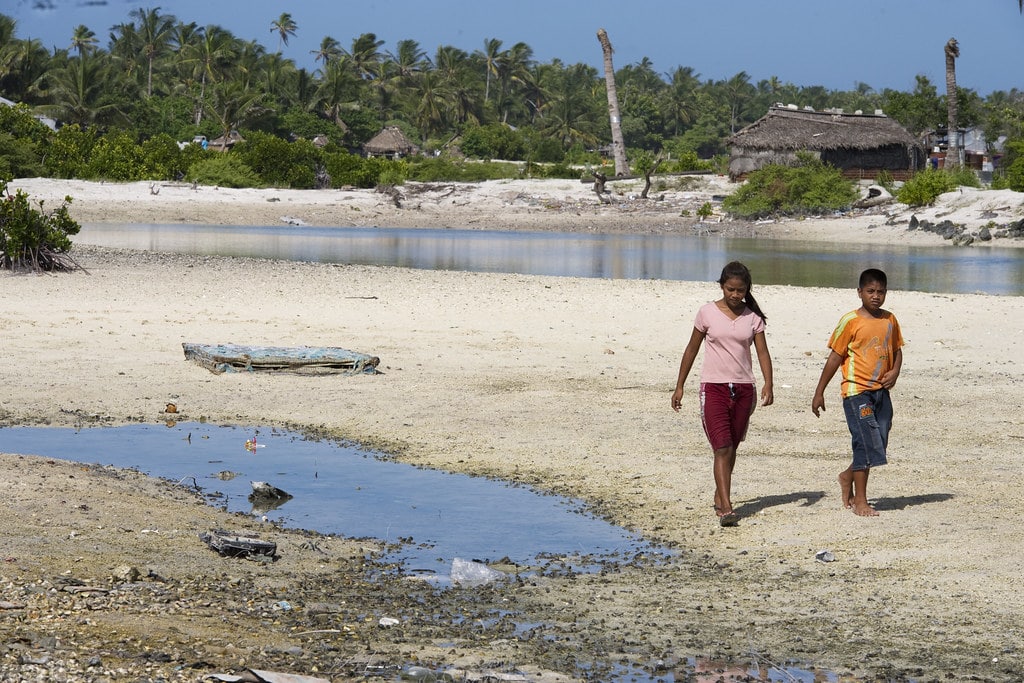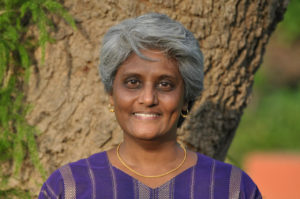
Tales From a Changing World
by Usha Alexander
(This is the fourth in a series of essays, On Climate Truth and Fiction, in which I raise questions about environmental distress, the human experience, and storytelling. The previous part is here.)
Tabea Bakeua lives in Kiribati, a North Pacific atoll nation. Her country is likely to be the first to disappear completely under the rising seas within a few decades. Asked by foreign documentary filmmakers if she “believes” in climate change, Bakeua considers and tells them, “I have seen climate change, the consequences of climate change. But I don’t believe it as a religious person. There’s a thing in the Bible, where they say that God sends this person to tell all the people that there will be no more floods. So I am still believing in that.” She smiles, self consciously, as she continues. “And the reason why I am still believing in that is because I’m afraid. And I don’t know how to get my fifty or sixty family members away from here.” She’s still smiling as tears fill her eyes. “That’s why I’m afraid but I’m putting it behind me because I just don’t know what to do.” She turns, apologetically, to wipe away her tears. [From The Tropical Paradise Being Swallowed By the Pacific by Journeyman Pictures.]
Bakeua’s response is one of many that people now have about anthropogenic climate change. Grasping for magic or miracles in the face of destruction and helplessness, her narrative is common among her hundred thousand fellow citizens. Having remained self-sufficient and sustainably prosperous in their way of life for thousands of years — while contributing effectively zero carbon emissions — they will abruptly be left with nothing as the encroaching tides sweep their lands out from under them, sacrificing their islands for the greater prosperity of other countries. The people of Kiribati played no part in triggering this annihilation and have no way of withstanding it. Nor is the international community throwing them a life raft — through compensatory rights to lands, housing, livelihoods, and autonomy, elsewhere, as would be just –nor even expressing meaningful concern for their plight.
How did we get to this tragic moment?
Continue reading here.
Other essays in the series “Of Climate Truth and Justice”:
Part I:
What We Talk About When We Talk About the Weather
Part II:
A Story of Fire and Ice
Part III:
Of Wanderers and Nomads

Usha Alexander was born to Indian immigrants who came to the United States in the 1950s and settled in the very small town of Pocatello, Idaho. She ran away to university at the age of 19, and later joined the US Peace Corps, where she served as a science teacher in the archipelago nation of Vanuatu. In the late 90s, Usha made her way to the San Francisco Bay Area of California, where she settled and worked for Apple Computer for many years.
Since 2013, Usha resides with her partner, writer and photographer, Namit Arora, in the National Capital Region of India. Usha has lived in four different countries and has learned to carry her home within herself, yet she frequently returns to the CA Bay Area with a certain sense of homecoming.